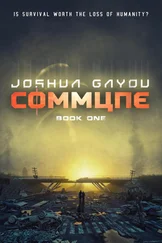During my walks, the guys both insisted that I go armed as we were all still thinking about the squatters who had been here before us and wondering if they would return. I didn’t want to lug my rifle around, bullpup or not, so we compromised: I wore a Glock at all times, taking it off only to sleep at night but keeping it at my bedside. Billy had a Glock 17 in one of his safes in the garage that I preferred to the 19 we had out on the road. It felt a lot more solid and substantial in my hands, and it also had some kind of fancy glow in the dark sights that Billy had installed after he purchased it. He said they were tritium, which meant about as much to me as if he had said they were super awesome unobtanium—all I knew was that I could see them in the dark and they were a lot easier for me to line up than the 19 with its flat, white dot sights. It also came with a belt and molded Kydex holster that rode comfortably on my thigh, putting it right under my hand when my arm hung naturally at my side.
Those walks were a big part of what helped me to work through my issues, and they are a practice that I continue to this day. Communal living is close living, and I’ve found that a regular dose of solitude plays a large role in keeping folks from clawing each other’s eyes out. Gibs likes to say that I’m “going out past the wire,” the old jarhead.
In the evenings I would spend a bit of time sitting on the porch while the sun went down. The others always detected when I was back, indicating that they were keeping a steady eye out for me, which made me feel good. Lizzy would come to join me around this time. Shortly after she arrived, Billy usually came out to bring us both a mug of hot chocolate like an old grandmother. He would then light some candles for us to see in the failing light and ask to join us, to which we always agreed. We would chat about nothing particularly important and sometimes plan out the following day.
The days themselves were not just filled with idle soul searching; there was plenty of work to keep us busy. Every day brought a new scavenging run of the surrounding areas, with the rarity of what we were going after dictating how far we would have to push out. Priority one was to get ourselves a decent gasoline reserve. We could all feel the clock ticking on unleaded gas, and we wanted to make as much use of those vehicles as we could while they would still run. I personally wanted to drive my vehicle as much as possible. I really loved that Jeep; it was my first new, truly nice car and I only got to use it for that first year after the fall of everything before the gas expired (we managed to extend the life of gasoline with the use of fuel stabilizers—we found box after box of the stuff on one of our earliest runs to an auto shop).
Before we could go out for gas, we needed containers to store it all in, so our very first run involved heading down to the hardware store and other home improvement stores to get as many plastic fifty-five-gallon drums as we could get our hands on. Jake and Billy made that run in the Super Duty with the trailer while I stayed home with Lizzy. We were learning that our small number was going to pose a challenge to our ability to effectively gather supplies in an efficient manner. The evidence of the squatters on the property cemented into our minds that concepts like enforceable property rights were a thing of the past. Our “ownership” of a thing depended completely on our ability to defend that thing from other people. If we left any of it unattended, there was nothing at all to stop others from coming in and taking it. This was, in fact, the very thing we were doing as we ventured out to gather supplies. We didn’t know if we were taking anything that someone else was depending on to be there when they returned to it. We saw something we needed, and there was nobody there to claim it; we took it.
After the plastic barrels were secured with the surplus diesel supply transferred into them, Jake and I went out hunting for gas the following day in the truck while Billy stayed home with Elizabeth. The truck bed was empty of everything at this point with the exception of one of the now cleaned steel barrels, every gas can we owned, the drip pans, the jack and jack stands, and the mallet and taper punch. The mission here was to get as much gas as we could as fast as we could.
“Fast” turned out to be a relative concept in this case. Finding areas congested with cars was easy; accessing them all as they became bunched up and stacked bumper to bumper less so. The fastest approach by far was to park the Dodge up as close to the target vehicles as possible, which often meant driving onto curbs or sidewalks. In those cases where we couldn’t do that, there was no choice but to walk gas cans into the tangle of vehicles and walk them back out to the truck to empty into the barrel; a trip that got a little further with each gas tank that we tapped.
We had a fifty-five-gallon drum to fill. The average car gas tank holds between ten and fifteen gallons, but the cars never had full tanks. Sometimes we got lucky and pulled as much as five gallons out of one car, but most of the time it was one gallon here, two there, and so on. Very rarely did it take more than one gas can to empty a tank—we were far more likely to get a tank that was bone dry.
Dry tanks were particularly frustrating. We could tell if a tank had anything in it by banging on it but, unless we were dealing with a truck or SUV, we sometimes had to go to the trouble to jack the vehicle up onto stands so that we could crawl underneath and give the tank a whack. All of this work added to the total time we had to spend out there. It took us some time to figure out that a vehicle with a corpse in the driver’s seat was more likely than others to have a dry tank; many people seemed to have died in their cars while trying to leave the city. Their cars just stayed in park and idled down to nothing after the driver expired.
All things considered, getting that fifty-five-gallon drum filled took all freaking day.
The next trip was all about clothes. Specifically, Billy didn’t have any clothes for women or little girls and all the stuff he did have wouldn’t fit Jake because it was too big for him. I was also specifically on the lookout for feminine supplies of all varieties (razors, sanitary items, lotions, and such). This was a bit easier to handle and required less drudgery.
Jake and I took the Jeep on that trip. There were several good options for clothing stores in Jackson that Billy was able to mark out for us on a map; all of which were, unfortunately, in the heart of the town where traffic pileups began to make the roads impassable. Even so, we managed to find a workable path near enough to Teton Kids that we didn’t feel like we would be leaving the Jeep in a completely unguarded situation. We also learned that going house to house was a very viable solution that had the added benefit of allowing us to scavenge other goods while we were there (in one house we even found a nice bolt action hunting rifle, a few boxes of ammunition, and a heavy compound bow with broadhead arrows). Going house to house did have the drawback, however, of putting us face to face with the very unsavory remains of the former residents; many of these incidents were heartbreaking. I remember one particular house in which I found my way into a bedroom with the remains of a child laying in his or her bed. Next to this, an adult corpse sat in a chair, bent over with its head resting on its hands on the edge of the bed. The child was very close to Elizabeth in size. It was unclear who had died first: child or parent.
I left the house and Jake had me spend the rest of the day standing watch outside with the Jeep while he went room to room in subsequent homes, for which I was grateful.
Читать дальше












